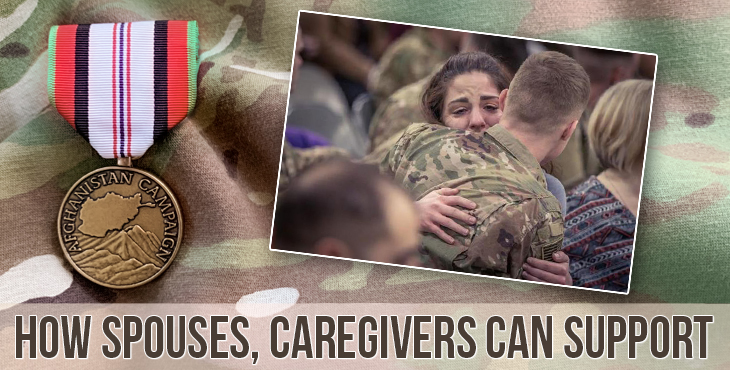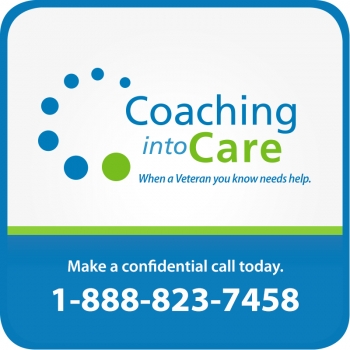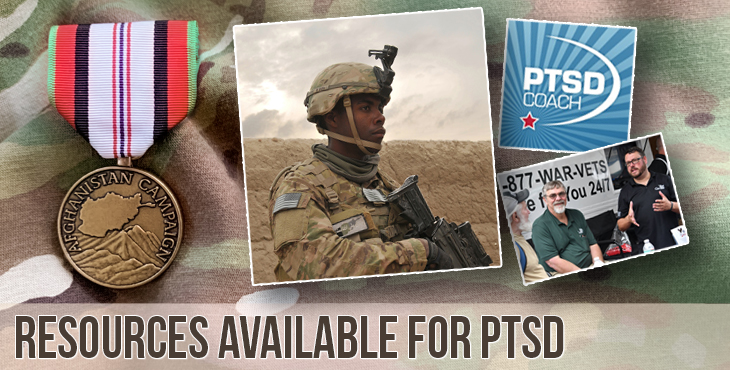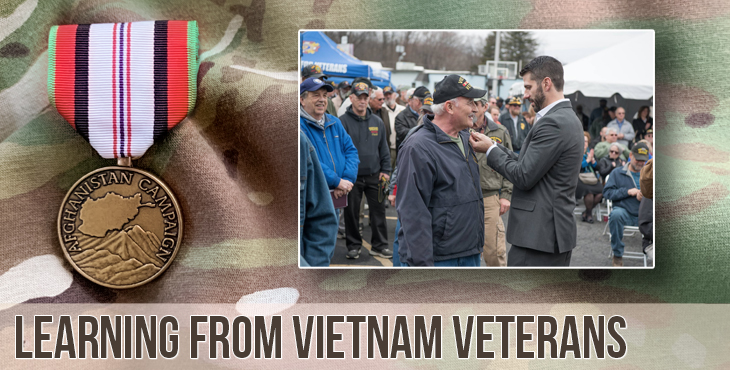This is the third in a four-part series about Afghanistan Veterans and how they can get help through VA. Read the other parts:
Part 1: Afghanistan: How Veterans can reconcile service
Part 2: Afghanistan: How Veterans can learn from Vietnam Veterans
Part 4: Afghanistan: Resources available for PTSD
The third part of this series focuses on spouses and caregivers, who are often on the front lines of helping a Veteran deal with posttraumatic stress disorder, or PTSD.
PTSD can alter a family’s relationships. Family member reactions can include sympathy, negative feelings, avoidance, depression, anger, guilt and health problems. Dr. Jennifer Vasterling, the chief of psychology at the VA Boston Healthcare System and affiliated investigator with the National Center for PTSD, said figuring out how to help a family member with PTSD can be hard to know how to best approach.
“As a caregiver, you don’t want to tell somebody that they shouldn’t feel the way that they’re feeling,” Vasterling said. “It’s tempting. If you see someone you love that’s in pain, you want to say, ‘It’s okay. You shouldn’t be sad.’ It’s really hard for caregivers or loved ones to step back and say, ‘Okay, this person who I care very much about right now is super sad, and I’m going to be supportive, but I have to allow them to be sad.’”
‘Push us to get help’
Senior Enlisted Advisor to the Chairman Ramón “CZ” Colón-López was one of those who deployed to Afghanistan. He battled PTSD for years before his wife, Janet, helped him realize he needed treatment. He said he’s proof that a spouse or caregiver can help a Veteran.
“Don’t let us get away with it,” he said. “Do what Janet did and push us to get help. Hell, drive us to the damn clinic. Do yourself a favor and go ahead and make sure you seek the help that you need.”
Helping Veterans
Dr. Sonya Norman, director of the National Center for PTSD Consultation Program, said helping Veterans deal with the range of emotions is an important step.
“The Veteran needs to feel what they’re feeling,” Norman said. “One of the things I hear a lot from Veterans is sometimes they want to talk about it, but they feel like they can’t because their loved one won’t understand, or they feel like the loved one will learn something about them that’s unforgivable. They’ll see them in a totally different light.”
Some caregivers may not feel ready to hear about a particular issue, Norman said. But that’s normal, and when they are ready, she added, telling a Veteran “I’m here to listen” while letting them know they are loved can spur a Veteran to open up.
“Acknowledging that can be very helpful,” she said.
According to Norman, if a Veteran isn’t willing to take that step to talk about difficult topics, just saying, “If you don’t want to talk about it, I’m here, loving you, too,” can help.
“We also hear a lot of Veterans that are worried, especially if there’s guilt involved, say, ‘I don’t want to hurt another person. I don’t want to hurt this person by sharing my pain with them, and now they have my pain,’” Vasterling said. “But as the caregiver, you can say, ‘It’s okay. I’m here to share your pain.’”
PTSD can also affect children, who can mirror the Veteran’s behavior or try to act like an adult. This can lead to a variety or problems: difficulty with school, sadness, anxiety and relationship problems.
Both Vasterling and Norman said getting Veterans the help they need is important. Critically, spouses and caregivers should know VA and other agencies are here to help.
Coaching Into Care
Coaching Into Care is a VA telephone based service that assists family members and friends in having productive and supportive conversations about seeking mental health care with the Veteran in their life. Topics include:
Recognizing the Signs – https://www.mirecc.va.gov/coaching/recognize-the-signs.asp
Tips for Family & Friends – https://www.mirecc.va.gov/coaching/tips-for-family-friends.asp
Family and friends can reach Coaching Into Care toll free at 1-888-823-7458.
Mobile app resource
PTSD Family Coach, available at https://www.ptsd.va.gov/appvid/mobile/familycoach_app.asp, is an app similar to PTSD Coach. PTSD Family Coach provides support for concerned family members of those with PTSD.
Features include:
- Information about PTSD and how it affects those who care about someone with PTSD.
- Tips to help families better support a loved one with PTSD – and themselves. The app includes information on how to find counseling.
- Facts about counseling for individuals or couples managing PTSD in a relationship.
- Tools to help family members manage stress.
- Self-created support network of people to connect with when in need.
Other resources
Learn about PTSD and different treatments through a whiteboard series.
The Veterans Crisis Line connects Veterans in crisis and their families and friends with VA responders through a 24/7 hotline: 1-800-273-TALK (8255), PRESS 1. There is also a 24/7 online Confidential Veterans Chat or text message support at 838255.
The VA Caregiver Support program provides services to support family members who are taking care of a Veteran: 1-855-260-3274
VA’s Coaching Into Care program helps family and friends of returning Veterans find the right words to help their loved one get into care. For free, confidential coaching email or call: 1-888-823-7458
The Vet Center Combat Call Center is a 24/7 call center for combat Veterans and their families to talk about their military experience or issues about readjustment to civilian life: 1-877-WAR-VETS
The Psychological Health Resource Center offers 24/7 support for service members and their families. Staff can answer questions about mental health symptoms and help the service members and their families find resources. Call 866-966-1020, email, or live chat.
The National Resource Directory links to over 10,000 services and resources that support recovery, rehabilitation and reintegration for wounded, ill and injured service members, Veterans, their families and those who support them.
Give an Hour is a nonprofit organization offering free mental health services to U.S. military personnel and their families affected by service in Iraq and Afghanistan.
Topics in this story
More Stories
The last part of this series focuses on resources available for PTSD. While this series focused on Afghanistan Veterans, options apply to all Veterans.
The second part of this series focuses on how those who served in Afghanistan can learn from those who served in Vietnam. While the conflicts are different, there are parallels.
Major news outlets for the past few months have focused on the nation’s longest war: Afghanistan. With a high of more than 100,000 U.S. troops in 2010, the number of troops continued to shrink over the past decade. While news coverage debates the decision to cease combat operations, the highest-ranking enlisted service member in the military said Veterans from the war should remember the positive to help reconcile their service.








I married to an OIF veteran. it took me 2 years to convince her to get help for PTSD. We had to move from city to a farm to avoid triggers such as around July 4th fireworks and AirMedCare. I know VA is not perfect and can do better, but it is better than anything else available in civilian sector. it is hard for veterans to talk about the symptoms and signs of PTSD with their providers and it is hard for the providers to know the problem if they don’t receive those information. as partner and caregiver I encourage you to collect the S&S and report it to the Physician who is treating your love one. We are living in a country that politician use any opportunities for their own benefit. they even use the veterans painful experiences and that is wrong but it is what it is and we can’t change them. in recent loss we had in Afghanistan you can see how they blame opposite party but when those survivor of the war come back with PTSD, then their social support is limited to their close love one. we need to educate whole country to avoid triggering the PTSD which is impossible. it is easy to set a table in a restaurant for 13 Heroes who lost their life for our freedom, but it is hard to be mindful to not shooting firework a week after July 4th at 2300 and wake a veteran with PTSD up in stress just for fun.
Iam a Marine combat veteran. I triped a grenade booby trap. Iam 100% for PTSD. I have serious shrapnel injuries. using the V A math is upward of 400%. The only thing that.saved me was a ruck sack. flack jacket and helmet. My wife applied for the caregivers program and was denied. I alreafy have aid &attendance. That video interview is a VA scam. How can they fully evaluate my need for full time assistance with a five minute video call. They did not even address PTSD. As long as Iam not bedridden Iam good to go! Iam so angry words can not discribe!!
I am married to vietnam veteran Army Ranger for 25 yrs now. Being Asian , you can imagine the crap I get all the time dealing with VA. Fact that we live overseas felt like it’s a punishment for us as we are told we are not entitled to many help available and I have to be the everything cuz the veteran has gave up long ago. He is 80% ptsd for the longest time and our board appeal for 100% has gone on more than 10 yrs and all we kept getting is lots of run around and unlimited c & p exams (mind you, they even got us embassy involved) but came to nothing. This process kept repeating. In many of my dealings for this sad soldier, all I can say is even someone determined like me who strives daily to keep
Him alive is near giving up. Try to imagine this – I work abt 12 hrs full time, cook, clean and takes care of everything right up to putting his meds on table and takes away dishes after he eats. I had to remind him many things n he gets angry and now I myself am having depression.
He just wakes up (he often tells me he wished he need not wake up) , lost all motivation to live or do anything, he has pains he won’t tell me as I will insist he has to see doctors and he uses alcohol to help himself and keep his sanity ( so he said) then he falls and I spent whole night with no sleep just trying to get him up fr floor. I am 60 myself , a cancer survivor , barely 5 ft and I play God to a soldier aged 70, full of unseen injuries, weighs almost 250 lbs now, bad knees , has shortness of breath even with 50m walk .. forgets all the time and still wants to take control!
I have even written to the President .. we call crisis line when desperate, they said they will call us but nothing.
Now we can’t even get his psych meds cuz we live abroad and due to Covid, we cannot do our annual travel yet the va docs said, if they don’t get to see veteran in person, no meds.
I cannot get everything here even if I go buy … I also know I am just releasing pain and frustration , I wonder how this can ever help us.
As spouse and caregiver, I am told I cannot even get a Covid test at va when we fly back next month and without test, cannot check into va facility. With all my might, how not to surrender?
My vet and our family have been fighting with the VA since we got out in 2013. Have had 7 evaluation have not gotten any results let alone rights to appeal. 4tbis that are service connected no percentage nor medical help with. Tinnitus so bad in both ears only one recognized though told to young for hearing aids. PTSD nightmares last sleep study restless leg and in controllable jerking and headaches do bad all documented. Still they do nothing. Claim he’s gotten better no tests ran since 2012 yet know his brain injuries healed. Our personel files and dependents taken off our deers. Last psych Dr told him the deployment is over time to move on and stop mallingering. 4 deployments mission off fob help establish kandahar yet can’t even get va to send us our results and appeals like our right to have.
Parry has involuntary spasms all day long even in his sleep which are causing him difficulty sleeping VA prescribed him methocarbamol which is not working, even though he is a 74 year old Vietnam veteran with nerve damage on his lower extremities his legs have giving out on him and hes losing mobility and he has constant pain from the nerve damage that he has to his back he has a pinched nerves on each side so we are trying natural resources to find different foods that have magnesium in it to tackle the spasms he is having the same pain in his right side from the kidney infection which his primary care physician doctors Azad did not follow up on, has not followed up on going on 2 months now and he has been back to the to the VA ER since, now I’ve done research to find out that the blood pressure medication that they have pescribed him stripper’s his body of minerals, night before last he fell off the bed at 4 in the morning because of his involuntary muscle spasm and hit his head on his nightstand he did not want to go to the VA hospital because he felt like it would be useless so I stayed up and observe him to make sure he did not have a concussion even though he suffered from a small knot on the right side of his head above his eye tomorrow I’ll be trying to cook beans because they have a powerful source of magnesium also encouraging him to eat Shredded Wheat for breakfast his mobility has gotten worse to where I have to make sure that I Shadow him in whatever he does when he uses the bathroom or take a shower or get dressed or gets out of bed! As his wife and caregiver I am burnt out I’m tired! Yet they denied our petition to be included in the caregivers program I have quit two jobs since we’ve been married for six years this year to make sure that I can take care of my husband in the right manner the VA has not made this easy with their appointment schedules with their lack of consistency when it comes to my husband’s health with them treating him as an addict and it’s not fair to him, he got hurt in a war that he was not supposed to be in and now as his wife I am bearing the brunt of it I asked for help and consideration it shouldn’t just take one video chat to determine that a person does not qualify to be compensated for the hard work and time that they put into caring for their spouse and their spouses ailments due to being a veteran and serving in a war for this country that he had no business being in! I noticed that the VA is very quick and often bragging about their accomplishment and not really focusing and taking care of the bigger problem here we have older veterans that are being thrown to the Wayside because of the lack of consistency and lack of compassion by the VA Administration that’s supposed to be taken care of them! Sincerely the wife and caregiver of a Vietnam vet
This is to any Iraq/Afghanistan veteran or active duty person who lives in or visiting Colorado Springs, CO: The Colorado Springs Fellowship Church (The LovingKindness Church) and Pastor honors and salutes you on the First Sunday of each month. We would like to honor you with a token of our appreciation for your service during this on-going war. We invite you to come out to our Sunday Morning Service (Sept 5th, Oct 3…) at 10:30am. The Address: 451 WIND CHIME PLACE, COLO SPGS, CO 80919. Each military member who has been deployed to Iraq/Afghanistan will be honored with a nice gift packet. Please come and bring a military ID or DD Form 214 to show proof of Service. The spouse (with a valid military ID) of a deployed service member can accept on behalf of the deployed member. This special salute is not applicable to Vietnam Veterans.
My name is Rock Hobbs, LtCol USAF retired and we offer a three day retreat that is geared to helping Vets and their spouses with PTSD and other associated issues. There is no cost to the Vet for the three day stay except for a nonrefundable registration fee of $25. We have trained professionals with PhD level credentials that teach the Vets about PTSD, why PTSD is affecting them and ministry for healing of personal and family wounds.
The VA system is a joke. I just paid over $900 for blood work through a nephrologist that Dublin VA wasn’t able to provide, nor have they approved me to see yet. I was in the ER there almost two months ago!
They have still to approve her or refund me. I pays $320 for 3 month supple of blood pressure meds.
Thanks for your service. My husband is a Vietnam Purple Heart Vet. He had PTSD before it was even diagnosed. Three wives and their children left him because they had no understanding of it. I’ve been married to him for 9 years. If you’re not getting help, you need an advocate. Someone to fight for you. You won’t like dealing with the VA, but you need someone who can keep you calm while they handle your business because you’re upset and you wont. Also when they interview the spouse or caretaker, the Vet should leave the room so the advocate can speak freely about the Vets condition. Write a letter to your Senator or Congressman, Put the ball in their court. If you’re getting 70% you can get 100% if you’re unable to work. I think it’s call unemployability. You have to apply for it. But there’s no new exams. If your spouse or another relative is caring for you at home like the 22year listed above, File for caregiver assistance. It’s different from Aid and attendance. It additional money but you have to apply for that too online. The resources are there, you just need an advocate to fight for you. GOD bless. Also, Keep the mask on. We were fully vaccinated and caught it from our unvaccinated grandsons. The side affects of having it is horrible even after it’s gone.
Thanks
My husband is a Retired Navy personal and he has changed so much after he lost his GS position 5 years ago. I pushed him to get help. We have been married for 30 years now and we have had a rough go at it. But over the past 8 months he has been o new meds and is working hard on himself and getting the therapy that he needs. It almost cost us our marriage. He was going down a slope that I could not help with. He tried to help from the VA years ago when he first retired but they were unwilling to help him. I am proud of the progress he is making.
I say all of this to the spouses out there, don’t give up. Make them get the help they need. We as family really will never know what they went through while serving our country. They really need to talk about it. Just don’t give up , the person you fell in love with is in there just asleep or in hibernation for a while.
One of the best things available to service member, active or retired is a new treatment called TMS (trans cranial magnetic stimulation) . It is noninvasive, no medications and works very quickly! It is available through the VA and has turned my life around! The research shows outstanding results in relief from depression, anxiety and other PTSD related problems! DON’T BYPASS THIS VERY USEFUL AND DYNAMIC TREATMENT. I have had PTSD since 1970 in Vietnam. You am so grateful to my VA psychiatrist for giving me relief from most of my symptoms!!
I am 70%PTSD and I am in need of a care giver. I use the only one that I can depend on at the moment. MY 22yo granddaughter. She knows when I am down.
Well, OK. I’m 100% ptsd combat disabled. I ask for help and get none.
Ask to see an Acupuncture Physician (AP/MSOM or LAc or DAOM) and they will give you a PSTD auricular treatment.
In my eyes drop Afghanistan and say Veterans we all in the same boat, second I have been denied access to the Vet Center in Dubois, Pa. for the past 3 3/4 years under threat of arrest because I wore an empty holster ! The VA in Altoona, Pa., has not been able to provide me with counseling for the past 3 3/4 years it has become insane. Yah I could use some help so far its been a lot of BS !